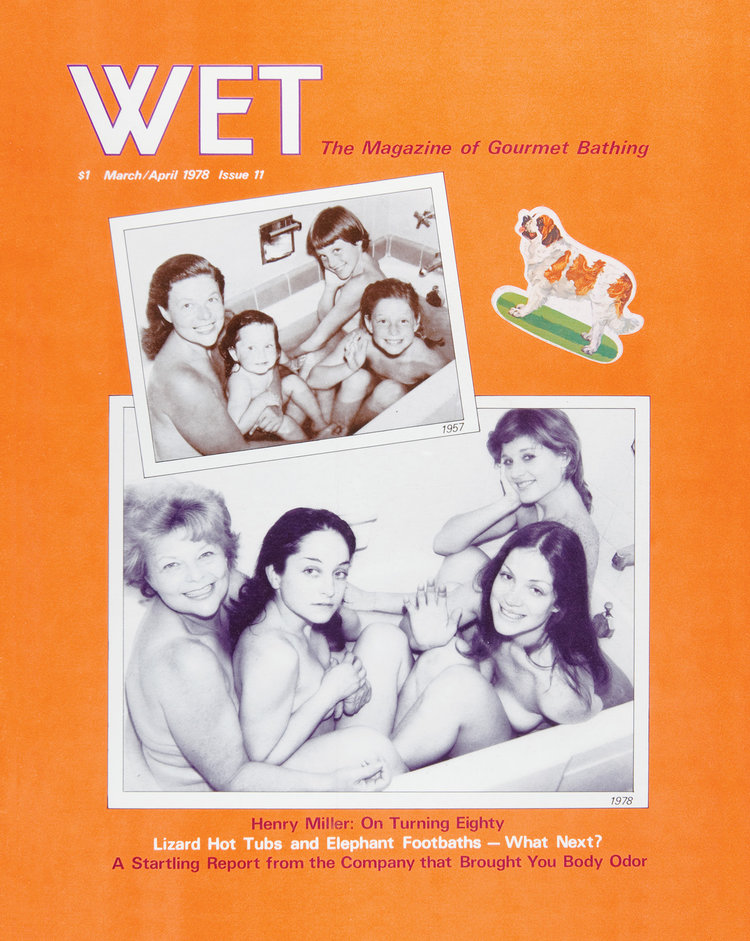I've just connected the dots - the founder of the cult 80's magazine WET (a periodical dedicated to 'gourmet bathing') was also the author of some of my favorite books on aesthetics (Wabi-Sabi for Artists, Designers, Poets and Philosophers, and Arranging Things) - Leonard Koren (not to be confused with the late Leonard Cohen). What a legend, and how obvious the man so poetically and artistically passionate about bathhouse culture is also so about Japanese-inspired aesthetics.
He epitomizes (early) 80's Los Angeles / California counterculture .
Leonard Koren was born in NYC in 1948, and raised in Los Angeles. He studied Architecture and Urban Planning at UCLA, but became more of an artist. In 1969, he co-founded the Los Angeles Fine Arts Squad, a mural painting group, and focused his own art on bathing scenes (17 Beautiful Men Taking a Shower and 23 Beautiful Women Taking a Bath). In 1976, Koren founded WET Magazine – a periodical dedicated to gourmet bathing, which was influential in the development of postmodern aesthetics. After WET concluded, Koren moved to Japan in the early 80's, where he wrote several works on aesthetics, most notably Wabi-Sabi for Artists, Designers, Poets and Philosophers, and produced a column on Cultural Anthropology for a Japanese magazine.
Favorite Quotes :
'How do I define a great bathing environment?... simply, or rather not-so-simply, a place that helps bring my fundamental sense of who I am into focus. A place that awakens me to my intrinsic earthy, sensual, and paganly reverential nature. A quiet place to enjoy one of life’s finest desserts amidst elemental surroundings. A profoundly personal place, even when shared with other people, suitable for the most intimate sacraments of bathing.' - AK
'To bathe is to fall into step with your biological rhythms: in and out breathing, the speed of blood coursing through your veins, the slowness of tiredness. … The mechanical world of objective time – seconds, minutes, hours – is irrelevant here. Taking a bath properly requires being able to guiltlessly linger, hang out, and/or do nothing whatsoever.' - AK
'Like the costumes that are shed, the nakedness in bathing is psychological as well as physical. You get exposed to and touched all over by the same stuff you’re mostly made of. Water doesn’t recognize any one spot as prettier or sexier than any other. Water wants it all.' - AK
Undesigning the Bath. Leonard Koren, Berkeley, 1996
'Why are most designers (architectural, interior or industrial) incapable of creating deeply satisfying bathing environments? This study strong visual appeal are antagonistic to a profound bathing experience. Extraordinary baths instead are complex and distinctly elemental; earthy, sensual and animistic. They are created by natural geologic processes by composers of sensory arousal working in an intuitive, poetic, open-minded manner. incapable of creating deeply satisfying bathing environments?' - AK
Arranging Things. A Rhetoric of Object Placement. Leonard Koren, Berkeley, 2003
'This book started out as an attempt to understand what made the arrangements I saw in a San Francisco store, Japonesque, so extraordinary. For years I visited Japonesque and enjoyed the unique arrangements of ceramic, rock, old wood, plant materials plus other sundry and eclectic objects and wondered what it was that gave them their imaginative vitality.' - LK
His other books on aesthetics, also inspired by Japanese culture : Wabi Sabi : For Artists, Designers, Poets & Philosophers. The Flower Shop : Charm, Grace, Beauty, Tenderness. Which Aesthetics Do you Mean?
WET: The Magazine of Gourmet Bathing was a founded in 1976 in Venice CA, following the success of a party Leonard threw at the Russian Banya on Pico, which was hosted in thanks to the volunteer models in his 'bath art' (photographic studies of people in unusual bathing situations). It ran thirty-four issues before closing in 1981.
'The magazine espoused a post-hippie philosophy of pleasure-taking, silliness, sensuality and play'
(The Atlantic) 'The only binding principle for WET's editorial scheme,' he notes in his new book, was to 'give the readers something completely unexpected tinged with absurdity.' WET ran pieces about cooking fish in the dishwasher, how to dress for the apocalypse, the latest in bathing techniques for non-human life forms, and the metaphysics of smoking a cigarette. 'Gourmet bathing was actually beside the point,' Koren says. 'Nothing was taken too seriously,' WET was 'a parody of enthusiasms taken a bit too far', an embrace of the sensual and absurd. Pleasure was its own excuse.'
'The world wasn’t crying out for a periodical on bathing when Leonard Koren introduced Wet magazine in 1976. However, Koren had the imagination and audacity to create his own world, and that’s exactly what he did with Wet'
Kristine McKenna, music editor for WET from 1979 until 1981.




































